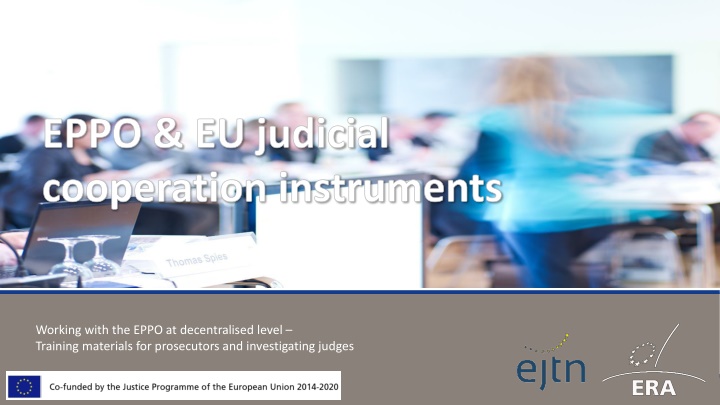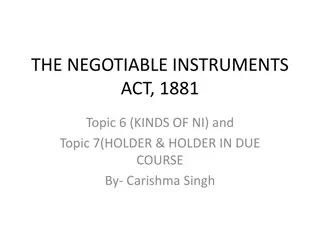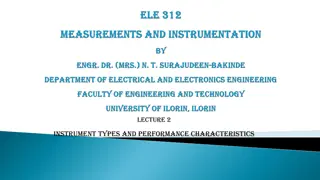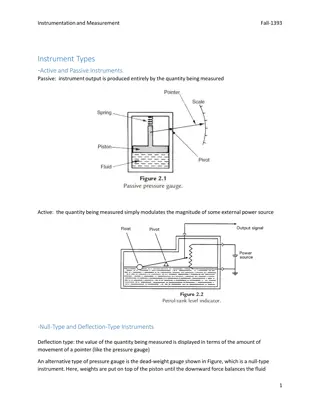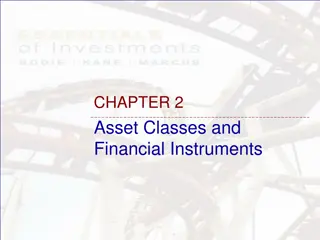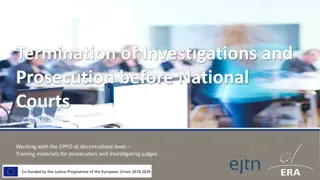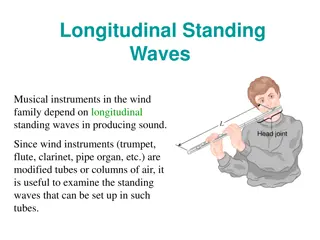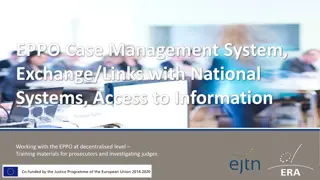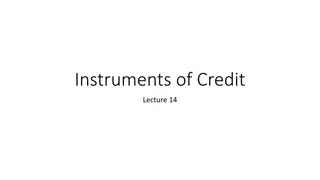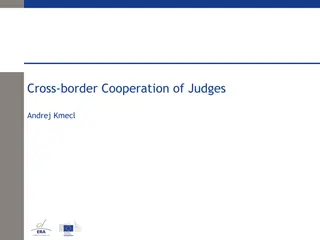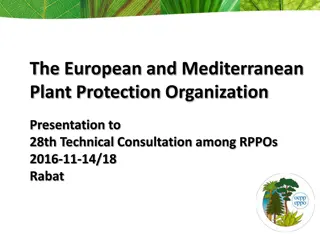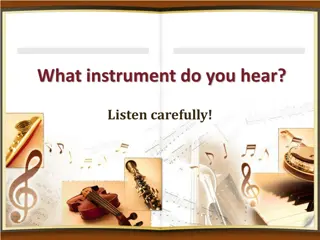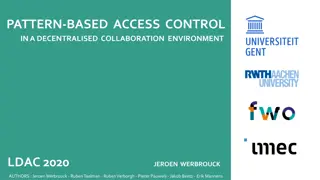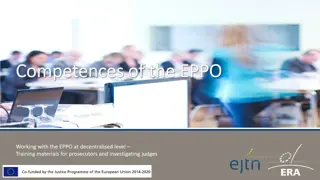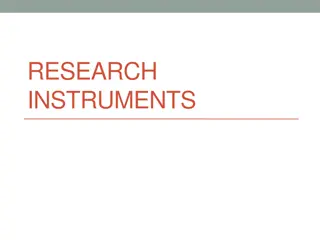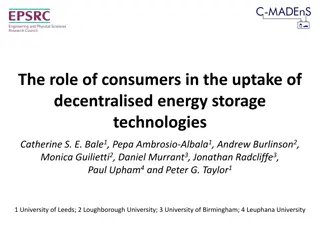EU Judicial Cooperation Instruments and EPPO: Working at Decentralised Level
The European Union's judicial cooperation instruments, including mutual recognition of judgments, form the basis for cooperation in criminal matters among Member States. The mechanisms outlined in various Council Framework Decisions and Directives emphasize mutual trust and compliance with EU law. The European Public Prosecutor's Office (EPPO) plays a crucial role in ensuring effective cooperation and coordination at decentralized levels, offering training materials for prosecutors and investigating judges.
Download Presentation

Please find below an Image/Link to download the presentation.
The content on the website is provided AS IS for your information and personal use only. It may not be sold, licensed, or shared on other websites without obtaining consent from the author.If you encounter any issues during the download, it is possible that the publisher has removed the file from their server.
You are allowed to download the files provided on this website for personal or commercial use, subject to the condition that they are used lawfully. All files are the property of their respective owners.
The content on the website is provided AS IS for your information and personal use only. It may not be sold, licensed, or shared on other websites without obtaining consent from the author.
E N D
Presentation Transcript
EPPO & EU judicial cooperation instruments Working with the EPPO at decentralised level Training materials for prosecutors and investigating judges 1
OVERVIEW I. EU JUDICIAL COOPERATION INSTRUMENTS Mutual recognition and mutual trust II. EU INSTRUMENTS FOR JUDICIAL COOPERATION & THE EPPO : HOW DOES IT WORK? Mutual recognition and beyond 2
EU JUDICIAL COOPERATION INSTRUMENTS JUDICIAL COOPERATION IN CRIMINAL MATTERS (ARTS. 82-86 TFEU) Shall be based on the principle of mutual recognition of judgments and judicial decisions. = a judicial decision issued by a competent authority in one MS must be recognised and executed by the authority of another MS as if it were a domestic decision = except in case of limited grounds for refusal = this principle is based on mutual trust between judicial authorities/ judicial systems and a presumption of compliance with EU law and particularly with the fundamental rights recognised by EU law 3
EU JUDICIAL COOPERATION INSTRUMENTS Convention of 29 May 2000 on Mutual Assistance in Criminal Matters between the member states of the European Union Council Framework Decision 2002/465/JHA of 13 June 2002 on Joint investigation teams (JITS) 1. Council Framework Decision 2002/584/JHA of 13 June 2002 on the European Arrest Warrant and the surrender procedures between Member States Council Framework Decision 2003/577/JHA of 22 July 2003 on the execution in the European Union of orders freezing property or evidence Council Framework Decision 2005/214/JHA of 24 February 2005 on the application of the principle of mutual recognition to financial penalties Council Framework Decision 2006/783/JHA of 6 October 2006 on the application of the principle of mutual recognition to confiscation orders Council Framework Decision 2008/909/JHA of 27 November 2008 on the application of the principle of mutual recognition to judgments in criminal matters imposing custodial sentences or measures involving deprivation of liberty Council Framework Decision 2008/675/JHA of 24 July 2008 on taking account of convictions in the MSs of the European Union in the course of new criminal proceedings Council Framework Decision 2008/947/JHA of 27 November 2008 on the application of the principle of mutual recognition to judgments and probation decisions with a view to the supervision of probation measures and alternative sanctions 4
EU JUDICIAL COOPERATION INSTRUMENTS Council Framework Decision 2009/315/JHA of 26 February 2009 on the organisation and content of exchange of information extracted from the criminal record between Member States Council Framework Decision 2009/829/JHA of 23 October 2009 on the application, between Member States of the European Union, of the principle of mutual recognition to decisions on supervision measures as an alternative to provisional detention. Council Framework Decision 2009/948/JHA of 30 November 2009 on prevention and settlement of conflicts of exercise of jurisdiction in criminal proceedings 2011/99/EU: Directive on the European Protection Order of 13 December 2011 2. 2014/41/EU: Directive regarding the European Investigation Order in criminal matters of 3 April 2014 3. Regulation (EU) 2018/1805 of the European Parliament and of the Council of 14 November 2018 on the mutual recognition of freezing and confiscation orders 5
EU JUDICIAL COOPERATION INSTRUMENTS = Long list: Pre-Lisbon instruments (Framework Decisions) Post-Lisbon instruments (Directives/Regulations) VARIABLE GEOMETRY: Post-Lisbon UK, IE and DK do not participate in measures in the area of Justice and Home Affairs. (Protocols 21 and 22 of the Lisbon Treaty) The UK and IE have the possibility to opt in to a measure = Most relevant MR instruments in relation to EPPO?: EAW (EIO/Freezing and confiscation Regulation) 6
EU INSTRUMENTS FOR JUDICIAL COOPERATION & THE EPPO HOW DOES IT WORK? 7
MUTUAL RECOGNITION AND BEYOND EPPO = PARADIGM SHIFT for participating MS (Currently 22: Austria, Belgium, Bulgaria, Croatia, Cyprus, Czech Republic, Estonia, Finland, France, Germany, Greece, Italy, Latvia, Lithuania, Luxembourg, Malta, Netherlands, Portugal, Romania, Slovakia, Slovenia and Spain) No longer judicial cooperation between judicial authorities of different Member States but a single prosecution office organised at a central with a decentralised structure which operates in participating countries. = Delegated Prosecutors (EDPs) located in their MS carry out investigations on EPPO s behalf = EDPs shall act in close cooperation by assisting and regularly consulting each other in cross- border cases No longer mutual recognition but assignment = handling EDP European assigns the investigative measure to an assisting EDP located in the MS where it needs to be carried out 8
MUTUAL RECOGNITION AND BEYOND EPPO in cross-border cases: Concerning participating MS: Direct action across participant MS is possible (e.g to conduct coordinated investigative acts, freeze assets in several countries, exchange information). = Handling EDP assigns measure to an assisting EDP in the other MS. No need for ad hoc JITs or MLA requests = But EAW procedure must be used to surrender a person who is not present in the MS of the handling EDP (Art. 33) = MR/MLA may be used if the measure assigned to an assisting EDP does not exist in a domestic situation but would be available in a cross-border situation (Art. 31.6) Concerning Non-participating MS/Third Countries: = MR or MLA instruments will still be necessary, and it is unresolved whether the non-participating MS/Third Countries will recognise EPPO within the existing legal frameworks 9
MUTUAL RECOGNITION AND BEYOND EPPO investigating across Participating MS: How does it work? Art. 31 Cross-border investigations: The handling EDP assigns the investigation measure to a EDP of the MS where it needs to be carried out. If it needs judicial authorisation under the law of the MS of the assisting EDP, he/she shall obtain it according with the law of that MS. If judicial authorisation is not necessary under the law of the MS of the assisting EDP but is necessary under the law of the handling EDP, the latter must obtain it. If the assigned measure does not exist in a purely domestic situation but would be available in a cross border situation covered by MLA/MR instruments the EDP may use such instruments 10
MUTUAL RECOGNITION AND BEYOND Most relevant EU Mutual Recognition Instruments: EIO European Investigation Order A judicial decision issued or validated by a judicial authority of a member state to have one or several specific investigative measures carried out in another member state in order to obtain evidence Applies to all Member States except Ireland and Denmark All types of investigative measures (except setting up a JIT) Specific provisions for: temporary transfer of persons in custody, hearing by videoconference or telephone, financial and banking information, controlled deliveries and covert investigations, interception of telecommunications, provisional measures. Imposes time limits for recognition (30 days) and execution (90 days) 11
MUTUAL RECOGNITION AND BEYOND Most relevant EU Mutual Recognition Instruments: EIO European Investigation Order The executing authority Shall recognize and execute under the same modalities as if the measure had been ordered by an authority of the executing state (except grounds for non-recognitions/execution) Shall comply with the formalities/procedures expressly indicated by the issuing authority if not contrary to fundamental principles of its law Shall use a different measure if the one indicated in the EIO does not exist in the law of the executing state/ would not be available in a similar domestic case/ can achieve the same result by less intrusive means 12
MUTUAL RECOGNITION AND BEYOND Most relevant EU Mutual Recognition Instruments: Regulation on Freezing and confiscation orders (shall apply from 19 December 2020) = execution without verification of double criminality fraud and other PIF offences where punishable in issuing State by a custodial sentence of a maximum of at least 3 years = transmission from issuing to executing authority by means of a freezing/confiscation certificate = execution (including management and disposal of property) governed by the law of the executing State 13
MUTUAL RECOGNITION AND BEYOND EPPO investigating across Participating MS: how does it work? Art. 32 Enforcement of assigned measures: Law of the MS of the assisting EDP but complying with formalities/procedures expressly indicated by the handling EDP unless contrary to fundamental principles of law of its MS Art. 33 Pre-trial arrest and cross-border surrender: Where it is necessary to arrest and surrender a person who is not resent in the Member State in which the handling European Delegated Prosecutor is located, the latter shall issue or request the competent authority of that Member State to issue a European Arrest Warrant 14
MUTUAL RECOGNITION AND BEYOND Most relevant EU Mutual Recognition Intruments: EAW European Arrest Warrant Most successful MR instrument (still) that replaced traditional state-to-state extradition conventions The available statistics furnished by Member States and compiled for 2005 2018 record a total of 185,575 issued EAWs, of which 56,298 were executed. An EAW is a judicial decision issued by a Member State with a view to the arrest and surrender by another Member State of a requested person, for the purpose of conducting a criminal prosecution or executing a custodial sentence or detention order" 15
FINAL QUIZ- TEST YOUR KNOWLEDGE To carry out a search and seizure in a participating MS different from the one of the handling EDP, in a case where no judicial authorization would be required for such a measure under the law of the MS of the handling EDP A) The handling EDP will need to issue an EIO B) The assisting prosecutor will directly carry out in his country the search and seizure assigned by the handling prosecutor, without further authorisations C) The assisting prosecutor will directly carry out the search and seizure assigned by the handling prosecutor in his country but will need to obtain judicial authorisation if required under his national law 16
Thank you for your attention WWW.EUROPEAN.LAW
